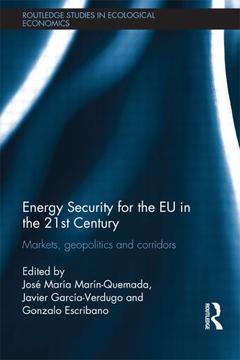Energy Security for the EU in the 21st Century Markets, Geopolitics and Corridors Routledge Studies in Ecological Economics Series
Coordonnateurs : Marín Quemada José María, García-Verdugo Javier, Escribano Gonzalo

Recent developments like the rising trend in crude oil price, the international economic crisis, the civil revolts in Northern Africa and the Middle East, the nuclear threat in Japan after the tsunami, the oil spill in the Gulf of Mexico and the economic growth of emerging countries like China and India have a direct relation to the security of energy supply anywhere in the world. This book provides a comprehensive analysis of energy risks, energy scenarios and energy policies with special reference to the European Union and its member states, emphasizing the economic and geopolitical dimensions of energy security.
The book assesses both quantitatively and qualitatively the socioeconomic and political risks related to the European energy supply, together with the EU?s energy relations with other countries. Two innovative indicators have been developed to estimate geopolitical energy risks and energy-related relations with other countries. The book also examines the process of convergence of member states? energy security policies, the path towards a common European energy policy, and the process of Europeanization projected towards the energy corridors through which the EU receive energy imports. In addition, alternative strategic scenarios related to energy risk are assessed. Finally, guidelines for the EU?s energy policy and new strategies using energy corridors are suggested in order to maximize EU?s energy security.
The book should be of interest to students and researchers across a wide range of subjects, including energy economics and policy, energy and foreign policy in the EU, energy policies in EU member states and several aspects related to international political economy.
Introduction Part 1: Energy, Geopolitics and Energy Security: Qualitative and Quantitative Analyse 1. Global Energy Needs and Resources: Geographical Imbalances and Energy Security 2. Energy Security, Energy Corridors and the Geopolitical Context: A Conceptual Approach 3. Energy Dependence, Vulnerability and the Geopolitical Context: A Quantitative Approach to Energy Security 4. Competition and Complementarity in the International Energy Markets: The EU’s Energy Affinity Index 5. Global Policy Scenarios and Economic Scenarios as Tools for Energy Policy 6. Long Term Energy Policy Scenarios for the World and the EU: A Comparative Analysis Part 2: Socio-Economic Energy Risk: Concept and Estimation 7. Risk Theory Applied to Energy Security: A Typology of Energy Risks 8. Quantifying Geopolitical Energy Risks: The Socioeconomic Energy Risk Index 9. Using the Socioeconomics Energy Risk Index: Aggregation by Corridors, Energy Models and Scenario Building Part 3: Energy Security and Energy Policy Convergence in the EU 10. Energy Security of Supply and EU Energy Policy 11. The Europeanization of EU Member States’ Energy Security Policies: Convergence Patterns 12. Guidelines for a European Energy Security Policy Part 4: New Strategies for the EU’s Energy Security Policy 13. Socioeconomic Energy Risk and Energy Affinity: Defining Strategies for the EU 14. A New Strategy: The Europeanization of Energy Corridors to the EU 15. Renewable Energy Corridors and European Energy Security
José María Marín-Quemada, Javier García-Verdugo and Gonzalo Escribano are Professors of Economic Policy at Universidad Nacional de Educación a Distancia (UNED), Spain.
Date de parution : 11-2011
15.6x23.4 cm
Disponible chez l'éditeur (délai d'approvisionnement : 14 jours).
Prix indicatif 178,41 €
Ajouter au panierDate de parution : 06-2015
15.6x23.4 cm
Disponible chez l'éditeur (délai d'approvisionnement : 14 jours).
Prix indicatif 53,83 €
Ajouter au panierThèmes d’Energy Security for the EU in the 21st Century :
Mots-clés :
Energy Pol Icy; EU’s Energy Secur; Energy; EU’s Energy; Economics of the European Union; Energy Sources; Oil; EU’s Energy Pol Icy; Energy Security; Vul Ner Abil Ity; Natural Gas; Vari Ables; Transit Coun; Scen Arios; Sustain Abil Ity; Geopolit Ical Con Text; Energy Cor Ridors; Energy Risks; Energy Secur; Inter Ests; Neces Sary; Lib Eralization; Energy Resources; Pon Ent; Common Energy Pol Icy; OECD Coun; Central ASIA; Stra Tegic Im Port Ance; Ref Er Ence; Pol Icy Ob Ject Ives



